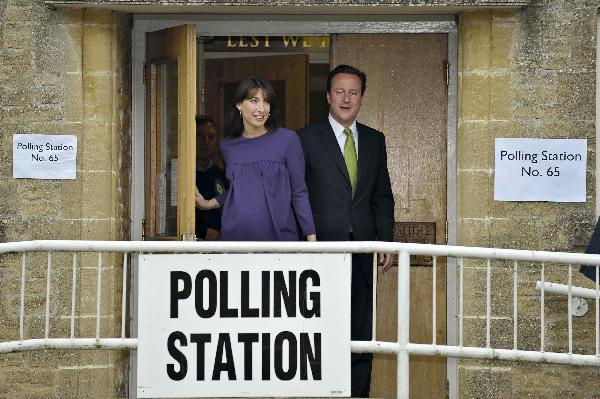Tories win but miss overall majority in Britain's election
A major exit poll commissioned by the BBC, ITV News and Sky News on Thursday night projected that Britain's Conservative Party won but just missed an overall majority.
 |
|
Britain's Conservative Party leader David Cameron (R) leaves with his wife Samantha after voting in Oxfordshire, England, May 6, 2010. British voters went to the polls on Thursday morning as up to 50,000 polling stations across the country opened in the most tightly contested general election in decades. [Ben Birchall/Xinhua/PA Wire] |
The exit poll has been revised, but the outcome remains the same -- a hung parliament.
The revised poll projected the Conservatives would win 305 seats in the 650-seat parliament, ahead of Labor with 255. The Liberal Democrats were projected in third place with 61 seats. Small parties got 29 seats.
The poll made the Tories the largest party with seats in the House of Commons, but leave them 21 seats short of the 326 members of Parliament the Conservative Party leader David Cameron needs to lead a majority government.
After the TV debate, Liberal Democrats have surged in the polls but are predicted to win even fewer seats than at the 2005 election.
According to Sky News, Cameron said the projected result is still enough for his party to take power. "Exit poll is decisive rejection of labor and we can govern with this result," a spokesman for the party said. Labor's Deputy leader Harriet Harman said "it is very much too early to say" the outcome of the vote.
In the event of a hung parliament, Prime Minister Gordon Brown, also leader of Labor Party, is entitled to remain prime minister to see if he can command the confidence of the House of Commons.
The findings were announced as voting closed at 10 p.m. local time (2100 GMT). Exit poll result was formed by the responses of about 17,000 voters across 130 polling stations. Counting was to continue through the night, and the winner would not be officially confirmed at least until Friday morning.
This exit poll was an accurate prediction of the eventual result at the last general election in 2005, but this election is the most difficult to predict in decades.
To form a majority government one party needs to win 326 seats in parliament out of a total of 650. Each seat contains a member of parliament elected by individual geographic constituencies under the first-past-the-post system which rewards the winner, but gives nothing to the losers in the constituency races.
The poll showed that Britain is heading for a hung parliament although the Conservatives are ahead during the three-horse race.
 0
0 







Go to Forum >>0 Comments